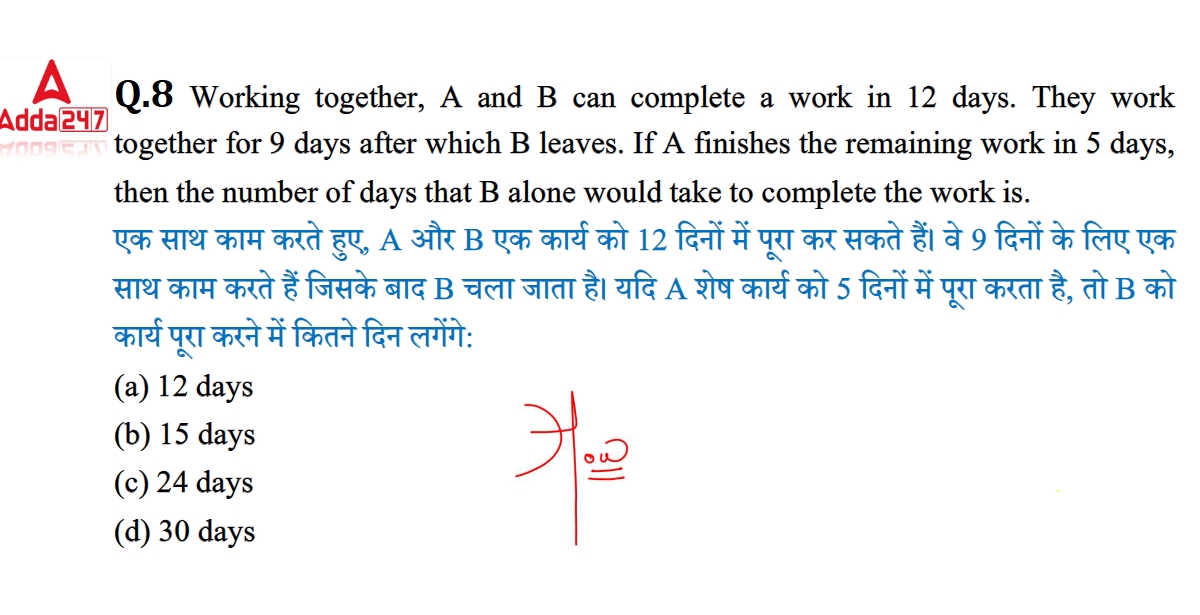Working together, A and B can complete a work in 12 days. They work together for 9 days after which B leaves. If A finishes the remaining work in 5 days, then the number of days th... Working together, A and B can complete a work in 12 days. They work together for 9 days after which B leaves. If A finishes the remaining work in 5 days, then the number of days that B alone would take to complete the work is.

Understand the Problem
The question is asking to determine how many days B alone would take to complete a work given the collaborative work dynamics of A and B. A and B work together for 9 days, after which B leaves, and A completes the remaining work in 5 days. We need to find out B's solo working days for the entire work.
Answer
B alone takes $30$ days to complete the work.
Answer for screen readers
B alone would take 30 days to complete the work.
Steps to Solve
- Determine the Work Rate of A and B Together
Since A and B can complete the work in 12 days together, their combined work rate is: $$ \text{Work Rate} = \frac{1 \text{ work}}{12 \text{ days}} = \frac{1}{12} $$
- Calculate Work Done in 9 Days
In 9 days, A and B together complete: $$ \text{Work Done} = \text{Work Rate} \times \text{Time} = \frac{1}{12} \times 9 = \frac{9}{12} = \frac{3}{4} $$
- Determine Remaining Work
The remaining work after 9 days is: $$ \text{Remaining Work} = 1 - \frac{3}{4} = \frac{1}{4} $$
- Find A's Work Rate
Let A's work rate be $a$ and B's work rate be $b$. We know: $$ a + b = \frac{1}{12} $$ Since A completes the remaining $\frac{1}{4}$ of work in 5 days, we can say: $$ 5a = \frac{1}{4} \implies a = \frac{1}{20} $$
- Calculate B's Work Rate
Substituting A's work rate into the work rate equation gives: $$ \frac{1}{20} + b = \frac{1}{12} $$ To find $b$, we subtract $\frac{1}{20}$ from $\frac{1}{12}$.
- Find Common Denominator and Calculate B's Work Rate
The least common multiple of 20 and 12 is 60. So, $$ \frac{1}{12} = \frac{5}{60} \text{ and } \frac{1}{20} = \frac{3}{60}$$ Thus, $$ b = \frac{5}{60} - \frac{3}{60} = \frac{2}{60} = \frac{1}{30} $$
- Calculate Days B Alone Would Take to Complete the Work
Since B's work rate is $\frac{1}{30}$, the number of days B alone would take to complete the work is: $$ \text{Days} = \frac{1 \text{ work}}{b} = \frac{1}{\frac{1}{30}} = 30 $$
B alone would take 30 days to complete the work.
More Information
B's work rate of $\frac{1}{30}$ means that in one day, B can finish 1/30th of the work. Hence, B requires 30 days to complete the entire work alone.
Tips
- Miscalculating the total amount of work done over 9 days.
- Confusing the relationship between A and B's work rates.
- Not properly solving for $b$ in the equation, leading to incorrect rates.
AI-generated content may contain errors. Please verify critical information